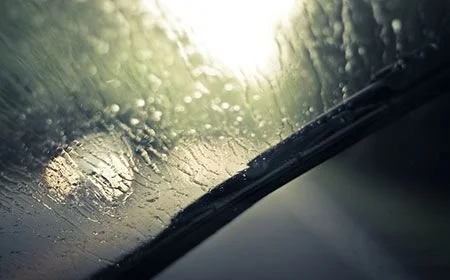Repentance and Windshield Wipers
We are blessed at Grace Church: By my estimate, typically over 10% of those attending our worship services, Bible studies, or other forms of fellowship are either an ordained minister or have attended seminary. (What do you believe attracts these individuals to Grace?) On top of that, Grace is blessed with so many members who have such a deep faith and understanding of the scriptures. As a result of all this “brain power,” one cannot help but learn something new or pick up a new way of looking at an old theological concept every time we meet together. I often find myself just sitting back and soaking it all in.
That happened to me the other week in our Wednesday night Bible study of Joshua and Judges. Tom Anderson, a retired minister, pointed out that we, like the Israelites, need to be constantly confessing and repenting of our sins. I later told Tom that I appreciated his comments because I often look at confession/repentance as part of one’s initial conversion rather than a daily Christian practice of sanctification/mortification of sin. This conversation led to the question of why—if we are justified by faith and our past, present, and future sins are forgiven—continued repentance is necessary for the Christian? Later, I received a thoughtful email from Tom, which I will repeat, in part:
The place of repentance for the believer: As we live our lives and unfortunately sin, we need to return to God in repentance and seek His forgiveness. We do so based on Christ’s work applied to us in our justification.
I like to compare repentance after salvation to windshield wipers. They seem so uncommon, and they’re never our focus. But they’re essential to what really matters: the ability to see the road in front of us in a rainstorm. We value windshield wipers, not because they’re a glitzy feature, but because they provide an unobstructed vision in the middle of a storm. The understated value of wipers helps us grasp the role of repentance. Unconfessed sin blurs our vision so we can’t see or communicate clearly with God; confession and repentance is how we remove sin so we can draw near to God once again by seeing and experiencing who and what we are in Christ through the act of justification.
Each act of repentance is not a new justification but a renewed application of our justification. Sin keeps us from seeing who we are in Christ. When we sin, we lose our consciousness of forgiveness and our sense of peace with God. When we confess our sins, by the work of the Holy Spirit, we are reawakened to what Christ has done for us, and God revives our security in Him and assurance of our salvation.
To be clear, Jesus paid for our sin and provides full forgiveness for what alienates us from God. Repentance doesn’t accomplish atonement. But it is part of how we walk daily in the forgiveness and cleansing Jesus purchased for us.
Confession and repentance wipe away the relational and fleshly junk and sin between us and God. Repentance restores us by eliminating what gets in the way—shame, guilt, and fear. We don’t often emphasize repentance, but when we realize how sinful we are, we grasp what a necessity repentance must be.
There is no contradiction between justification by grace through faith and our need for ongoing forgiveness of sin. We ask God to forgive us not to be re-justified but to walk before Him in confidence that Christ has paid it all, and we are debtors to grace alone. Justification occurs once for all time, yet confession and repentance and receiving forgiveness is ongoing until we are glorified and sin no more.
With this assurance and understanding we continue to pray daily for forgiveness—not with the despair of one who thinks he is lost, or God no longer loves us, but in the confidence of justified and adopted children approaching a heavenly Father who has declared us just, forgiven, accepted, and loved in Jesus Christ. As we confess our sin, God forgives us on the basis of Christ alone.
How wonderfully said by Tom. (I just love the windshield wiper analogy.) At Grace, we are so fortunate to have Tom, and those like him, to instruct and encourage us. And the next time you turn on your car’s windshield wipers—what will you remember to do? Soli Deo Gloria.
Carter


